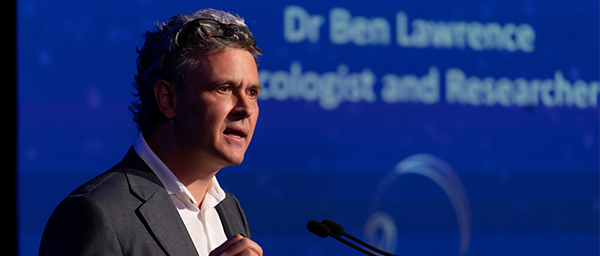Community
Forsyth Barr is proud to support the Gut Cancer Foundation
When you add them all up, cancers of the upper and lower digestive system are the most common form of cancer in New Zealand and a number of them, especially pancreatic cancer, have low survival rates. The Gut Cancer Foundation is on a mission to get more Kiwis to realise how prevalent and deadly these cancers are and to raise funds that can be directed towards research, support and education. And Forsyth Barr has stepped up to help.
“Our vision is to make a lasting impact on New Zealanders impacted by cancers of the digestive system. There are multiple different cancers that we cover - oesophageal, pancreatic, gallbladder, liver, stomach, bowel and anal cancer - and we try to create impact in a number of different ways,” says the Gut Cancer Foundation executive officer Liam Willis.
The importance of awareness
Over the past three years, Willis says the foundation has done a lot more work to raise awareness of the symptoms and risk factors of these different cancers, and a big part of that is the Give it Up for Gut Cancer fundraising campaign that runs in March.
“We’re starting to raise awareness about these cancers and the need we have to get funding. And once the awareness starts, you see the funding start to come in.”
Sir Eion Edgar KNZM, who died in 2021 from pancreatic cancer, was the chairman of Forsyth Barr for over 20 years, and was renowned as one of the country’s most generous philanthropists. When Willis heard he had passed away, he approached the company to offer his condolences and share plans to stage an inaugural gala ball in 2022. Led by Gut Cancer Foundation ambassador, and pancreatic cancer patient, Nyree Smith, the PanCan Gala was the vision of a dedicated group of pancreatic cancer advocates who formed the PanCan Gala Committee and created the event as a way to raise more money and awareness for pancreatic cancer.
Forsyth Barr made a significant donation to the event, on the proviso that some of the money was ring fenced to benefit people with pancreatic cancer.
A foundational investment
“I can’t underscore how important it was to get that buy-in and commitment from Forsyth Barr at an early stage for this project,” says Willis. “It gave us and the committee the security to go and say ‘alright we can do this and do it really well’. It was a catalyst for this new funding regime.”
Other sponsors came on board and the PanCan Gala raised a total of $160,000.
From his first conversations with the Gut Cancer Foundation, Forsyth Barr’s Head of Marketing and Client Experience Philip O’Neill says two things were clear.
“They are a small team, with limited resources, tackling a huge problem. We saw that our support could make a real difference. But we also really liked that they saw our support as an investment. We could help make the PanCan Gala a reality and the gala would raise more money to make research a reality, and so on. We support good investments and this was clearly one.”
Willis says $80,000 of the total was made available as part of a competitive grant round for researchers looking at treatments for pancreatic cancer, which was rounded up to $100,000. The remainder will be spent on awareness campaigns, and patient and whānau education and support.
“This recent grant round for clinical trials would not have happened without the gala and the gala wouldn’t have happened without the sponsors buying into what we were trying to achieve.”
The Pancreatic Cancer challenge
While a combination of better screening and treatment options have seen overall cancer survivability rates improve considerably in recent decades, Willis says that isn’t the case for pancreatic cancer.
Over the past 40 years, the five year survival rate for breast cancer has gone from 40% to 90% and they now talk about 10 year survival rates, he says. Compare that to the five year survival rate for pancreatic cancer, which has gone from 8% to just 12% in the same period.
And this deadliness partly explains the lack of awareness, he says.
“One of the reasons is very stark. When it comes to pancreatic cancer, just one person out of every ten diagnosed with the disease survives, so there isn’t as much patient advocacy as there is for something like breast cancer. Those who get it also tend to die quite quickly so it can also be very traumatic for whānau and this doesn’t necessarily turn into support or advocacy.”
As far as treatments go, like many cancers, picking it up early is very important, but as there is no screening process for pancreatic cancer, it is often diagnosed too late to be cured.
One significant risk factor is the presence of pancreatic cysts. Patients found with a specific type of cyst (IPMN) have a 25% chance of developing pancreatic cancer.
“For this group of patients, the only way to definitively prevent it from happening is to go for a full pancreas removal. It’s a massive operation and it changes your life. You become a diabetic overnight, there are a lot of long-term implications, and a lot of risk involved.”
Because a lot of these patients have comorbidities, it often makes the surgery too dangerous.
“That means they just have to wait. It’s like a ticking time bomb.”
A treatment with promise
But there is hope, because the local researchers that received the gala grant are looking at whether a promising preventative treatment can be used cost effectively within New Zealand’s hospital environment.
A clinical trial involving 20 patients is currently underway at Waikato and Waitematā Hospitals and involves a gastroenterologist injecting a chemotherapy solution directly into the cysts to kill the cells.
“All the research so far suggests it’s incredibly effective and non-invasive. There’s no major surgery, no side effects and it eliminates the risk of one of the more brutal cancers. This particular trial is so good because it’s preventative. There are other trials looking at treatments, but ultimately that means someone has the cancer, so it’s an uphill battle. It’s better to solve the issue before it arrives.”
Willis says the foundation will continue to raise awareness through more and better patient and whānau stories, and it is planning on using some of the money raised through the gala ball on targeted leaflet and information campaigns in hospitals and GP offices.
Given the success of the first PanCan Gala, Willis hopes to continue working with the PanCan Gala Committee to make the event a regular feature, so that gut cancer patients and their families will continue to benefit.
To find our more, visit www.gutcancer.org.nz
Giving back to New Zealanders
Read the articles below to find out more about some of the groups and initiatives across the country that we support, or download our latest Forsyth Barr in the Community booklet.

Share My Super

The Prince’s Trust

